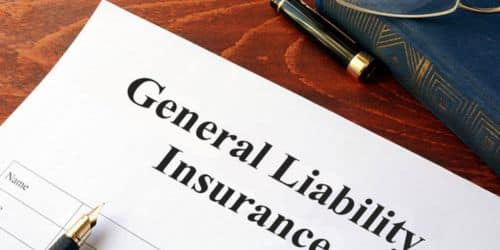As a small business owner or contractor, it is critical to safeguard your company against potential risks and liabilities. General liability insurance is an important insurance policy to consider. Having the correct general liability insurance for a contractor can offer you financial stability and peace of mind, whether you operate in Florida, California, or any other state. You can secure your business, your clients, and your reputation by purchasing general liability insurance, allowing you to focus on what you do best.
What Is General Insurance Liability?
General liability insurance is a type of insurance that protects businesses financially in the event of third-party claims. It pays for expenses resulting from bodily harm, property damage, and personal injury caused by the company’s operations, products, or services. This insurance helps firms protect themselves against legal liabilities such as medical expenditures, legal defense costs, and settlement or judgment amounts. It is critical for businesses to reduce the financial risks linked to potential lawsuits or claims from customers, clients, or other parties impacted by their company’s actions. Businesses can have peace of mind knowing they are financially protected in the event of an unanticipated accident or incident by purchasing general liability insurance.
Small Business General Liability Insurance
Small business general liability insurance is a specific type of insurance coverage designed for small businesses. It provides protection against third-party claims for bodily injury, property damage, and personal injury. Small businesses face various risks and liabilities, and having general liability insurance can help protect them from financial losses resulting from lawsuits or claims. This insurance coverage is particularly important for small businesses, as they may have limited resources to handle legal expenses and potential settlements or judgments. By obtaining small business general liability insurance, entrepreneurs can safeguard their businesses and focus on their operations with confidence, knowing they have coverage in case of unforeseen incidents or accidents. It provides peace of mind and financial protection, allowing small businesses to navigate the challenges of the business world with greater security.
General Liability Insurance for Contractor
General liability insurance for contractors is a special insurance coverage for individuals or companies working in the construction industry. It provides protection against third-party claims for property damage, bodily injury, and personal injury that may occur during the course of construction projects. Contractors often work in environments where accidents or property damage can occur, and having general liability insurance helps mitigate the financial risks that relate to such incidents. This insurance coverage is essential for contractors, as it can cover legal fees, settlements, or judgments resulting from claims made against them. It provides contractors with peace of mind and allows them to focus on their work, protecting them against potential liabilities. This General liability insurance for contractors is a crucial component of their risk management strategy, ensuring adequate protection in the event of unforeseen circumstances or accidents on the job site.
General Liability Insurance Florida
General liability insurance in Florida is a type of insurance coverage that protects businesses from financial losses resulting from third-party claims for property damage, bodily injury, or personal injury. Florida, like other states, has specific laws and regulations governing liability insurance. Obtaining general liability insurance is particularly important for businesses in Florida due to various factors such as the risk of hurricanes, slip and fall incidents, and other potential liabilities. By having this insurance coverage, businesses in Florida can protect themselves from legal and financial consequences resulting from accidents or incidents that occur on their premises or as a result of their operations. General liability insurance in Florida provides businesses with the necessary protection and peace of mind, allowing them to focus on their core activities without worrying about potential liabilities. It is a vital component of risk management for businesses operating in the state.
General Liability Insurance California
General liability insurance in California is a type of insurance coverage that offers protection to businesses against third-party claims for property damage, bodily injury, or personal injury. California has specific laws and regulations governing liability insurance, making it essential for businesses to obtain this coverage. With the diverse industries and high population in California, businesses face various risks and potential liabilities. General liability insurance provides financial protection and helps businesses navigate legal challenges that may arise from accidents or incidents. Whether it’s a slip and fall accident, property damage, or a customer injury, having general liability insurance in California is crucial for businesses to safeguard their assets and reputation. This insurance coverage allows businesses to focus on their operations while being prepared for surprising claims and legal expenses. It is a key component of risk management for businesses operating in the state of California.
What Is an Example of a General Liability Policy?
A general liability policy might cover a customer who visits a retail business and slips on a damp floor, resulting in injuries. In this situation, the general liability policy would cover the wounded customer’s medical expenses. Also, as well as any legal fees if the customer decided to sue. If the incident caused damage to the customer’s personal items, the policy would also cover property damage. General liability insurance is to protect businesses against many forms of third-party claims. Also, to provide financial assistance in the event of accidents or injuries that occur on business premises or as a result of business operations.
Also, Product Liability Insurance: What It Is, All You Need to Know, and Best Liability Insurance read:
What Does a Cgl Policy Cover?
A Commercial General Liability (CGL) policy protects organizations against a wide range of potential dangers. It often covers physical injury coverage, including injuries experienced by a third party on the business premises. However, as a result of the business’s operations. Property damage caused by the business’s operations or products is also covered by the policy. It also covers personal and advertising injury claims such as defamation, copyright infringement, and false advertising. The CGL policy protects firms from potential financial losses caused by legal claims and covers legal defense costs. It is crucial to remember, however, that particular coverage may vary according to policy conditions and restrictions.
What Is the Difference Between Public Liability and General Liability Insurance?
Public liability insurance and general liability insurance are two terms often used interchangeably, but they have some distinct differences. Public liability insurance typically refers to coverage that protects businesses from claims made by members of the public. This is for injuries or property damage that occur on their premises or as a result of their operations. It focuses on risks related to the public and third parties.
On the other hand, general liability insurance is a broader term that encompasses public liability coverage. But also includes coverage for other types of liability risks. General liability insurance provides coverage for bodily injury, property damage, personal and advertising injury, and other potential liabilities arising from a business’s operations. It offers more comprehensive protection against various risks that a business may face.
Public liability insurance specifically addresses claims arising from interactions with the public. General liability insurance offers broader coverage for a range of liability risks faced by businesses.
Read: Corporation Liability Insurance: Definition, What It Covers & How it Works
What Are General Liability Risks?
General liability risks are the potential liabilities that enterprises may encounter in the course of their daily operations. Body harm, such as slip and fall incidents, and property damage caused by company activities. Product liability for defective products, and advertising injuries, such as defamation or copyright infringement, are examples of these hazards. Contractual liabilities, medical expenses, legal defense costs, and reputational damage are examples of general liability hazards. Businesses must identify and evaluate these risks in order to determine the appropriate level of general liability insurance coverage required. This is to defend their interests and limit potential financial losses. Businesses can also operate with confidence and reduce the burden of unforeseen liabilities by addressing these risks.
Read: Corporation Liability Insurance: Definition, What It Covers & How it Works
Who Is Insured Under a Cgl?
Under a Commercial General Liability (CGL) policy, several parties may be insured. This typically includes the named insured, which is the business entity listed on the policy. Additionally, employees, executives, volunteers, and other authorized representatives of the insured entity are typically covered. Furthermore, CGL policies often provide coverage for individuals or entities that are considered “additional insureds.” However, as per a contractual agreement with the named insured. The specific details of who is insured under a CGL policy can vary depending on the policy terms, endorsements, and the contractual relationships between the parties involved. It is important for businesses to review their policy and consult with their insurance provider. However, to fully understand the scope of coverage and who is included as an insured party under their CGL policy.
FAQs
What exactly is liability coverage?
Liability coverage compensates you for property damage and/or bodily harm caused by an accident in which you were at fault. Most states require this coverage in order to legally operate your vehicle. Liability coverage is divided into two categories: property damage and physical injury.
Is liability insurance the same as insurance?
Liability coverage compensates others for injuries and property damage caused by your negligence. Full coverage frequently refers to liability and other state-mandated coverages, as well as vehicle damage. Although it is not actual insurance coverage.
What is the definition of a general liability account?
All legally binding debts payable to a third party are stored in a liability account. Liability accounts are recorded in a company’s general ledger and consolidated into liability line items on its balance sheet.
Related Articles
- PERSONAL INJURY ADVERTISING: Complete Guide to Personal Injury Lawyer Marketing
- Commercial General Liability Insurance CGL US: Policy, Coverage, and Costs
- 7 Steps on How to Start a Construction Company( Guide)
- OVERTIME IN CALIFORNIA IN 2023:All You Need to Know
- LANDSCAPING INSURANCE: Top Best Landscaping Insurance Companies for 2023






